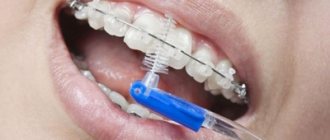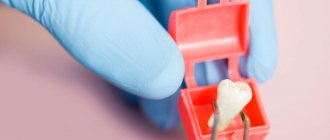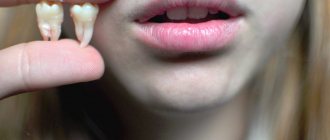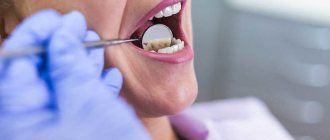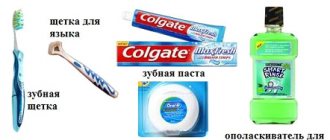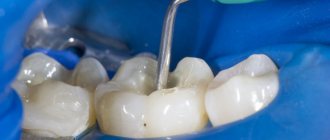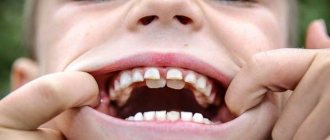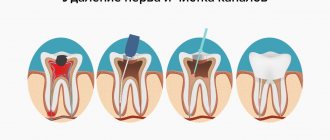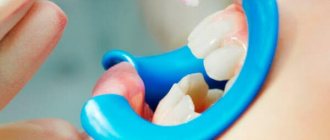Toothache is a very unpleasant and painful sensation, at the first sign of which you should immediately consult a dentist. Even slight soreness can hide hidden problems, and if you do not pay attention to it, pathology can develop. A good specialist will be able to make an initial diagnosis based on the patient’s individual pain, if it is felt in the area of the upper front teeth; there can be many causes and diseases.
Front teeth
Beautiful front teeth are a person’s beautiful smile and their calling card. They are located on the front of the jaw and perform the main functions during eating. Their functionality frees other lateral teeth from frequent chewing movements, thereby protecting them from unnecessary work.
The front teeth are very different from the rest:
- They are located very tightly to each other; there are rare cases of a large gap between them.
- It is very difficult to see them completely with the naked eye;
- They are more often than other teeth subject to bruises and injuries;
- Thin layer of teeth and enamel;
- All obvious problems on them are visible to everyone around them.
Stress
Any stress causes health problems. Nerve damage can manifest as toothache.
Often, a consequence of stress can be neuritis, causing pain throughout the entire oral cavity.
When experiencing stress, a person involuntarily clenches his teeth. This has a very bad effect on the enamel, which begins to wear off, and also overworks the jaw joints. The cause of pain after stress can be neuritis. This occurs due to inflammation in the trigeminal nerve, which causes severe pain in the teeth. Nerve problems may also cause fever, facial numbness, and rash. The pain occurs spontaneously and may be pulsating. Often there is another unpleasant symptom – a headache, which grows along with a toothache.
You should pay attention if there are unpleasant sensations in the lips, cheeks and gums - this will be a clear sign that the toothache was caused by stress.
Causes of pain
There can be several causes of aching pain in the upper front teeth. Often the problem appears after eating solid food: nuts, seeds or pistachios. Another common cause of pain is injury or bruise. For an accurate diagnosis and relief of the patient’s condition, the doctor must take an X-ray of the jaw. But there are other reasons for the ailment of the front teeth, such as:
- Physical trauma to the oral cavity;
- Facial nerve disease or nervous system disorder;
- Destruction of tooth enamel;
- Gum diseases (periodontal disease, periodontitis);
- High sensitivity of teeth;
- Pain as a wisdom tooth grows can spread to the entire jaw;
- Complications after dental treatment;
- Increased plaque on the teeth and pressure on the gums.
Very often, the cause of toothache in the upper front teeth is the unstable emotional state of the patient. Normal fatigue or stress can affect the condition of our teeth. If after a nervous breakdown there is a headache, it means that your teeth may soon ache.
What causes the problem
There are certain types of groups and pathologies when a person feels as if all his teeth hurt at once. Some are of a dental nature, while others have nothing to do with teeth.
The feeling that all your teeth hurt can be caused by the following factors:
- Gaps and cracks in teeth , increased sensitivity. If this is the problem, your jaw will hurt when you eat cold and hot foods, as well as sweets. Symptoms can appear unexpectedly and disappear just as unexpectedly. If therapy for multiple caries has been carried out, a similar phenomenon may occur;
- if a person has several teeth affected by caries at once , this can give a feeling of soreness throughout the jaw;
- with nerve damage it may also feel as if the entire side is painful. Symptoms are inconsistent, they appear and then go away;
If the nerve of the tooth is damaged, the entire side of the jaw will feel painful - With periodontitis , tissue is affected and pus can sometimes collect. With this disease, the entire jaw can be painful. Sometimes she even gives it to your face;
- if there are cysts , discomfort may be felt throughout the entire jaw without a specific location. This creates the feeling that everything hurts at once. In this case, a person may feel severe weakness and malaise;
- if all your teeth ache at once , perhaps the culprit is a pathology such as pericoronitis, in which wisdom teeth grow incorrectly;
- inflammation of the gums , while they turn red and blood flows;
- the result of improper treatment of caries, if the filling is installed incorrectly and parts of the infection remain in the canal;
- Sinusitis is also one of the causes of this phenomenon. This is not surprising, because with this disease, fluid stagnates in the maxillary sinuses, resulting in pain. So a person can get a headache, as well as a toothache.
The discomfort is not always of a dental nature. If you visit your dentist regularly and feel that everything is fine, other factors may be causing your pain:
- ARVI and hypothermia. If your feet are very cold, this can affect your teeth. In this case, you need to drink warm milk and thoroughly steam the limbs;
- emotions. The entire jaw may ache as a result of severe emotional shock. The best solution would be sedatives and healthy, sound sleep;
- headache may also give in the jaw;
If you have heart disease, your jaw may become sore - if there are heart problems , pain may radiate to the left arm and jaw. Often this phenomenon occurs before heart attacks;
- damage to the trigeminal nerve . If this happens, the entire row aches on a certain side;
- otitis media can cause pain in the chewing teeth;
- damage to the facial joint can lead not only to pain, but also to muscle dysfunction.
The main dental enemy is caries
According to statistics, it is caries that most often affects the upper frontal teeth, and it is interesting to understand where it comes from and how to fight it, in order to have time to carry out prevention and save your incisors from this disease:
Heredity plays a large role in the formation of this problem. If you have a predisposition to this disease, and everyone in your family has this problem, it will probably reach you too. In this case, it is necessary to take more careful care of the oral cavity.
Failure to follow hygiene rules is a fairly common problem among people. Some people cannot find a few minutes to clean their teeth, but then they have to spend a lot of time and money on treating them.
Poor hygiene is the main reason why the upper front teeth ache
Improper and unbalanced nutrition. If there are not enough certain substances in the diet, teeth can become thin, transparent and brittle. In addition, pathogenic bacteria will begin to multiply in such an oral cavity, and all this will lead to caries.
Complex structure of teeth. It is very bad when there are large gaps between the teeth; it is in them that food accumulates and harmful microorganisms multiply, which lead to caries.
Professional problems. There are professions that work with various alkalis and acids, these chemicals create health problems, namely with teeth.
Pain in pregnant women
During the period of gestation, a woman’s body weakens greatly, because at this moment it begins to work for two. In this case, the load increases significantly and the likelihood of various diseases increases. When the expectant mother does not particularly monitor her diet and consumes few nutrients, then the teeth begin to lose their strength.
Competent therapy implies adherence to the principles of prevention , which will not lead to the development of serious consequences. Control your diet, maintain oral hygiene, and use various additional care products.
In times of severe pain, there is no need to take medications, as they can cause harm. You need to urgently seek medical help.
Consequences of advanced dental disease
If the front teeth in the upper jaw ache for a long time, and the patient does not turn to a specialist, the consequences can be very serious and painful. And the problem will no longer be the aesthetics of your smile, but, in general, your well-being.
Doctors warn that rotten or inflamed teeth can cause such serious diseases as disorders of the skeletal system, arthritis, arthrosis, and polyarthritis. The germs that contribute to oral decay enter your body through your blood and saliva. And, as a consequence of all this, a person develops various problems with internal organs. The infection is very fast and can spread throughout the body and affect not only bone tissue, but also the human brain.
Why does my teeth hurt?
Hypersensitivity does not appear without a reason. For this, there are always some provoking factors, which the doctor must establish and then eliminate. There can be many of them:
- Poor nutrition, lack of some vitamins and minerals in the daily diet. This leads to a weakening of the protective layer, deterioration of the structure of dental tissues, and as a result, to various dental diseases.
- Mechanical damage to the enamel - the appearance of cracks and chips, which leads to the entry of bacteria and various irritants into the tooth. This can happen after a blow, severe pressure on the jaw, an accident, or other injuries.
- Frequently eating cold and hot food, especially with a sharp change in temperature.
- Various gum diseases - periodontal disease can provoke exposure of the neck and root of the tooth, which react more intensely to any aggressive influences.
- This often happens to people who have recently undergone a professional enamel cleaning or whitening procedure. These sensations are considered normal and short-term, but can also manifest themselves as an allergic reaction to the products used by the dentist.
- Some diseases of the nervous system, gastrointestinal tract, and internal infections worsen the condition of enamel and dentin. So, teeth sometimes ache with a cold, sinusitis, flu, runny nose, osteochondrosis, etc.
- Hormonal imbalances also often manifest as painful sensations in the oral cavity. Women notice this especially acutely during pregnancy or menopause.
- Even stress can cause inflammation of the facial nerve, one of the symptoms of which is increased sensitivity of the enamel.
- Poor oral hygiene often leads not only to pain, but also to various pathologies.
- Heredity is a fairly common factor that influences the tendency to hyperesthesia or any other dental problems.
- Diseases of the oral cavity – caries, pulpitis, etc.
- Thinning of the enamel, which leads to an increase in such reactions to any irritant.
- Even an incorrect bite can cause hyperesthesia.
- Some medical errors, for example, when removing wisdom teeth, could affect nearby units, which led to their sensitivity.
Treatment
The teeth in the front part of the jaw are thin and fragile, and their treatment is always painstaking. We must take into account the fact that they must look aesthetically impeccable. The specialist must select the desired color for the filling so that it does not differ from the shade of the tooth itself. The restoration must be carefully completed. There are two ways to treat upper incisor teeth:
- Filling;
- Microprosthetics or implant installation;
The first method is used when the problem is minor, and tooth enamel can be restored or caries can be cleared using a filling. Even such a simple procedure must be performed by a good dentist, and make sure that the materials are of high quality.
If the patient has advanced the disease of the front teeth to the point of severe caries, which has penetrated into the very depths of the enamel or even the root, then treatment will be carried out using the second method. First, you need to treat the tooth, and if it has not been removed, then a special-purpose overlay is put on it, which is called a veneer. This plate helps hide all obvious problems, chips and defects of the cutter.
When treating pulpitis, local anesthesia is always performed. For minor inflammation of the tooth, medications are administered to destroy the inflammatory process. If the problem is large and the dental nerve cannot be saved, it is removed, cleaned, and then the canal is filled. And only after such serious treatment can the tooth be restored.
If the doctor has diagnosed periodontitis with accumulation of tartar, then the front teeth should be cleaned of tartar and therapeutic treatment for inflammation. With this disease, periodontal pockets are cleaned manually; the course of treatment is about 10 days.
If the front teeth are inflamed due to ulcers or redness on the gums, then treatment will consist of constant treatment of the entire oral cavity with various antiseptic drugs. In parallel with this treatment, it will be necessary to take immunomodulators to strengthen the immune system.
The fluoridation procedure or remineralization is carried out in cases of destruction of tooth enamel. After this treatment, pain when eating hot or cold food will disappear forever. First, you need to clean the tartar on the tooth surface, then apply fluoride-containing paste very carefully. It must be applied very carefully; it should not get on the mucous surface of the oral cavity, otherwise it will cause a chemical burn.
If the dentist does not find any problems with the teeth, then the next specialist to visit a patient with pain in the front teeth should be a psychiatrist or neurologist. These doctors will certainly solve his problems.
Causes
The nerve endings of the teeth are combined with each other and the gums into one chain. If the disorder affects one area, the pain can begin to spread throughout all nerve fibers at once.
Therefore, if a carious process or pulpitis affects several dental units, pain appears in the entire jaw. In such cases, it may be difficult for the doctor to detect the problem tooth.
Also, the causes may be associated with other pathologies in the body. This is usually accompanied by the presence of additional characteristic symptoms.
Dental factors:
- Caries (if the process affects several dental units at once). Hard tissues soften and collapse, dentin is affected.
- Gingivitis.
- Cracks in the enamel or increased tooth sensitivity, dentin exposure.
- Pulpitis . The nerve bundle of the tooth is involved in the carious process.
- Periodontitis . Purulent contents are released from the gums, lymph nodes become enlarged, and the temperature rises.
- Pericoronitis . Occurs when the eighth molars erupt incorrectly, if the gum tissue is not dense enough or there is not enough space in the oral cavity.
- Root cyst . Damage to the soft gum tissue occurs. It may not make itself felt in any way and is often detected only on an x-ray. Its presence is often accompanied by general weakness and increased body temperature.
- Poorly treated caries . If the filling is placed incorrectly or remains of infected tissue in the tooth cavity.
Non-dental reasons:
- Sinusitis . Mucus stagnates in the maxillary sinuses and causes discomfort. Often not only all the teeth hurt at once, but also the head.
- Cluster headache . Occurs due to dysregulation of vascular tone. The pain radiates to the forehead, temporal and ocular areas on one side.
- Inflammation of the trigeminal nerve . Burning pain in the face, which gets worse when talking or eating.
- Otitis media . Pathogenic microorganisms penetrate the middle ear and cause inflammation. In its advanced form, the pathology threatens with serious complications - meningitis and encephalitis.
- Angina pectoris . Severe pain in the chest radiates to the shoulder, upper limbs and lower jaw.
- Jaw injuries (especially extensive ones).
- Stress.
- Blockage of the salivary duct. There is no saliva, and patients complain of dry mouth.
- Hypothermia.
- Colds.
- Temporomandibular joint dysfunction . The pathological process causes changes in muscle tone. Develops as a result of bruxism or an incorrectly installed filling. Characterized by ear pain and headaches, joint cracking, and increased tooth sensitivity.
Prevention
It is always better to engage in preventive procedures than curative ones. What prevention is needed to avoid painful or aching sensations in the front teeth? As a rule, these are simple and familiar hygiene procedures.
- Limit the amount of sweet and starchy foods in your daily diet;
- Visit the dentist at least once every six months and undergo preventive teeth cleaning;
- Choose the right toothpaste for you;
- Brush your teeth as often as possible, at least twice a day;
- Clean the spaces between the teeth with special dental floss;
- Try not to injure your jaw, protect it from injuries and blows;
- Include foods rich in calcium and phosphorus in your diet.
Attention! It is necessary to brush your front teeth more thoroughly, and examine them and the entire oral cavity in the mirror daily.
And you must remember that at the first, even the most minor, alarming symptoms, you should contact a specialist for a quick and painless solution to your dental problem.
Treatment depending on the problem
Pain due to trigeminal neuralgia is relieved by a combination of antihistamines, vasodilators and anticonvulsants. On an outpatient basis, physiotherapeutic measures - physiotherapy, electrophoresis - can help you get rid of unpleasant sensations.
The affected joint is treated with local anesthetics, for example, Lidocaine gel. The drug is rubbed in with massaging movements. Its action lasts for 30 minutes. The product can be used up to 10 times a day
Among the contraindications for the use of local analgesics are: infection of the soft tissues of the treated area; arterial hypotension; severe renal and liver failure, hypersensitivity to the components of the drug. If conservative therapy does not bring results, then surgical intervention is recommended to the patient.
For dysfunction of the temporomandibular joint, a splint made of medical silicone is used. The device fixes the jaws in an anatomically correct position. The splint relaxes the chewing muscles and joints, which reduces the intensity of pain. The fixation device can be used on all patients. The joint is then treated by an orthodontist or orthopedist.
If pain in the upper teeth is associated with sinusitis, then sinus treatment is required. In this case, antibiotics, various drops and sprays are used.
If mucus in the nose occurs due to allergic reactions, then antihistamines are used for treatment. If an allergy in the oral cavity occurs due to taking medications, then to reduce the severity of unpleasant symptoms, the mouth is periodically rinsed with warm water.
Tooth pain caused by dental problems can only be eliminated with the help of a dentist. Treatment is postponed for infectious and viral diseases in acute form. Professional intervention with a weakened immune system can lead to unpleasant consequences. We are talking not only about colds, but also about rashes on the lips and in the oral cavity.
Dental treatment is contraindicated for herpes, gingivitis, stomatitis, etc.
Homeopathic treatment
Homeopathic remedies are not as effective as pharmacological drugs, but they do not have a negative effect on other systems and organs, such as the digestive tract.
If all your teeth hurt on the left or right side, the following systematic medications will help:
- Bryony. Copes with headaches that radiate to the jaw and reduces the sensitivity of teeth to external irritants.
- Coffea cruda. Used for toothache in children and inflammation of the trigeminal nerve. The plant is prescribed for twitching symptoms that are relieved by exposure to cold.
- Glonoinum. The plant has found wide use in neuralgia. Prescribed for headaches radiating to the teeth on the right side.
- Staphysagria. Effectively copes with pain in the early stages of caries, accompanied by increased sensitivity of the enamel. The remedy is used if discomfort intensifies in different parts of the jaw when inhaling air or consuming cold foods.
- Hamomilla. Used during teething in children. The medicine is also used in cases where the elements ache on one side.
Mercurius is recommended for various inflammatory processes in the oral cavity. Homeopaths prescribe a remedy for toothaches associated with sinusitis, otitis and caries
Traditional medicine
Aspen bark has a good anti-inflammatory and analgesic effect when all teeth ache. A medicine based on a herbal ingredient is prepared according to the recipe: wood shavings are poured with 500 ml of water and left to simmer for 30 minutes.
For excruciating pain, use another remedy: 1 tsp. add a few drops of vinegar and black pepper. The ingredients are thoroughly mixed and heated in a tablespoon for 1 minute. Peas are made from the resulting mixture and applied to the problem area. Folk remedies are suitable for providing first aid to the victim and for relieving unpleasant symptoms after tooth extraction.
Folk remedies that help with aching sensations throughout the jaw also include:
- rinsing with soda solution;
- calendula-based compresses;
- rinsing your mouth with sage decoction.
First aid
Suddenly, my upper front tooth began to hurt, what should I do? It often happens that a tooth begins to ache on a weekend or in a place where you do not have the opportunity to immediately see a dentist. At first, there are ways that will help drown out painful sensations using traditional methods.
- One of the most common methods is rinsing the mouth with soda, chamomile or sage solution;
- Beetroot juice is considered an effective way to relieve pain, namely, it is rubbed into the painful area as often as possible;
- Apply a drop of clove oil to the problem tooth;
Among medications, painkillers such as Nalgesin, Nurofen, Ibuprofen can relieve the condition well. There are also dental gels that can have an anesthetic effect on the sore part of the jaw for some time. For example, Metrogyl Denta gel has not only an analgesic effect, but also an anti-inflammatory and disinfecting effect.
Attention, if pain occurs in the upper front tooth when pressing, do not try to diagnose yourself. There can be many possible pathologies that cause pain. Only consultation and treatment with a dentist can get rid of pain.
All these tips and recipes are intended for first aid only; then you need to immediately consult a dentist at the first opportunity. Only he will prescribe you effective and efficient treatment. By following the preventive measures described in this article, you will never know what pain in the upper front teeth is.
What to do if your teeth hurt?
The best decision is to see a dentist. The specialist will diagnose:
- using tapping with a probe to determine the location of the problem;
- will use a stream of cold water or air for the same purpose;
- palpate soft tissues to detect possible tumors and edema;
- will take an x-ray that will help establish internal pathologies of dentin, pulp or roots.
The treatment procedures themselves will vary greatly depending on the different problems found. Depending on the reason that caused the increased sensitivity of the enamel, various methods of eliminating it are chosen:
- Treatment of dental pathologies or periodontal tissues is carried out.
- Restorative agents based on fluoride and potassium are used, which strengthen the enamel well.
- They can use special mineral complexes, applying them to the surface of the teeth for intensive tissue regeneration.
- They use ultrasound or laser therapy on the painful area.
If any pathological processes are present, it is important to initially eliminate them and only then begin to restore the enamel structure.
Treatment of aching pain in healthy teeth
So, with a whole crown, these pains are caused by irritation of the nerve endings due to their hypothermia (usually) or overheating (less often, but it happens).
Therefore, our task here is to calm the “unhinged” nerve endings in the pulp:
- If we really want, we can resort to treatment with decoctions and infusions (including alcohol) of herbs with an anti-inflammatory or analgesic effect - chamomile, celandine, cloves, saffron, etc.;
- Even an aqueous solution of soda - sodium bicarbonate - is suitable for us. In this case, they should rinse the entire mouth at least 4 times a day, daily, until the pain disappears;
- By the way, in between meals you can lubricate your gums with clove oil - an analgesic that helps relieve even the symptoms of pulpitis;
- You can even place a not too hot heating pad on the aching area. Warm up for 15 minutes. 3 times a day will be enough.
But, if the crown is intact, it is impossible to get to the irritated pulp through the mouth; you should not expect a direct (and therefore pronounced) effect from these rinses - its basis is still created by heating with a warm solution or a heating pad, and the medicinal properties of the plants used are of secondary importance. So we can just as easily just swallow a tablet of “Analgin”, “Ketanov” or any other analgesic to taste. After this, we should give the aching area the same warming with a not too hot heating pad.
However, under no circumstances should we treat this pain with Vitafon or any other wave emitter, even if the instructions for it indicate the exact opposite. A tooth is a complex structure capable of resonance no worse than a crystal glass. Therefore, the use of such devices can accelerate the destruction of its enamel significantly.
In addition, irritated or even inflamed nerve endings respond to the resonance of the surrounding tissues with an acute lumbago, followed by a hellish burning sensation. So it’s not worth doing this, especially since there will be no benefit from such therapy in our case.
